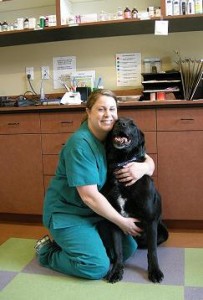 Cancer is one of the last things we want to think of when it comes to anyone we love, whether they be family, friends, or even our pets. However, it is important to know a little about pet cancer, since cancer is the leading cause of disease-related death in dogs and cats, and because early detection greatly increases the chances that your pet can be successfully treated. Read on to discover answers to common pet cancer questions.
Cancer is one of the last things we want to think of when it comes to anyone we love, whether they be family, friends, or even our pets. However, it is important to know a little about pet cancer, since cancer is the leading cause of disease-related death in dogs and cats, and because early detection greatly increases the chances that your pet can be successfully treated. Read on to discover answers to common pet cancer questions.
What is cancer?
The basic biological characteristics of cancer are the same for our pets as they are for humans. As in humans, cancer can affect virtually any organ or system in an animal’s body, from the bladder to the blood. Healthy cells go through a cycle in which they grow and multiply as the body requires. Sometimes, abnormal cells can grow and divide at uncontrolled and unhealthy rates, resulting in tumors and masses. These growths can be benign (non-cancerous), or they can be malignant (cancerous). In other cases, cancer cells do not form masses, but they invade the blood, causing the cancer to travel throughout the body.
My dog has a lump, is it cancer?
Not all lumps and bumps on dogs or cats are cancerous. To know for sure, you need to have your animal checked out by a veterinarian. Some lumps and bumps are just masses of fatty tissue (called lipomas) and are common and non-cancerous. For cat owners, it is important to monitor the site of a vaccine injection, as a bump there can signal a problem. Sometimes a dog or cat can have cancer without ever developing a noticeable lump or bump.
Is my pet at risk?
Cancer is the #1 disease-related cause of death for our furry friends. Diseases, including cancer, don’t discriminate: they can affect any breed or type of dog, though some breeds are more susceptible to certain cancers than other breeds. Most dog cancers affect adult and senior dogs, though dogs of any age can be affected. Early detection is crucial, so it is important to talk to your vet about the risk factors for pet cancer in your animal.
What are the symptoms of pet cancer?
While some animals will not exhibit any outward signs of cancer, many pets that develop cancer will display some or all of the following characteristics:
- Loss of appetite
- Weight loss
- Difficulty eating or swallowing
- Difficulty breathing, urinating, or defecating
- Unusually swellings that persist or grow
- Offensive body odor
- Persistent lameness or stiffness
- Sores that don’t heal
- Bleeding or discharge from any body opening
- Hesitation to exercise or loss of stamina
How can I be proactive about pet cancer?
Detecting pet cancer early can greatly increase the chances of successful treatment and recovery. Pet health experts recommend bi-annual wellness exams and yearly blood screenings, which can help to catch problems before they become difficult or impossible to treat.
Is pet cancer treatable?
In many cases, and especially when the cancer is caught early, pet cancer IS treatable. Thanks to veterinary medical advances, there are many options in treating pet cancers including surgery, radiation, and chemotherapy. Treatment for pet cancer depends on many factors including the type of cancer, how far the cancer has progressed, the age of the animal, and more. It is best to speak with a vet, like the specialists at the Snug Animal Hospital, to learn about possible pet cancer treatments.


Leave a Reply